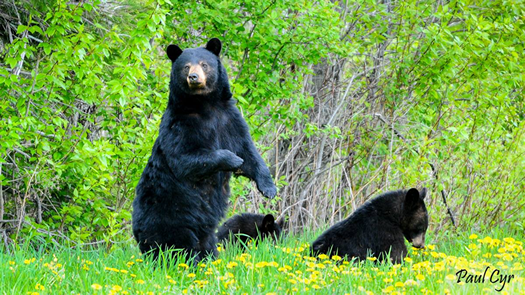
Maine’s bears are waking up. And they’re hungry.
By Christopher Burns, Bangor Daily News Staff
The bruins are back. No, not the Boston Bruins (the less said about this season, the better). The black bears.
No, not the college hockey team (though the UMaine men are having a stellar season).
We’re talking about the quadrupedal predator out in the woods.
It’s springtime, and that means the bears are waking from their long winter slumber — and they’re on the prowl for a meal. And they don’t care if it’s your bird feeder or trash can. They are hungry and determined.
During the winter, black bears slow their metabolism and breath as little as one breath every 15 to 45 seconds, and as a result their heart beats just eight to 21 times a minute, according to the Maine Department of Inland Fisheries and Wildlife.
While hunkered down in their dens, blacks don’t eat, drink or — ahem — answer the “calls of nature,” if you catch my drift.
Despite their greatly lowered metabolism, black bears still lose a tremendous amount of weight. So no surprise that they are searching for a feast.
And the offerings right now are a bit slim, if you haven’t noticed. Spring has only begun to sprung, leaving the bears with limited options, such as insects, grasses, sedges and leftover hard mast, the wildlife department said.
That makes your discarded fruits, grains, meats, pizza crusts, peanut butter jars and snacks an attractive buffet for our hungry bruins.
But there are a few things you can do to keep them out of your backyard:
— For one, you can keep your trash cans inside until it’s time to go to the dump or put them out for the garbage truck.
— Take your bird feeders inside between April 1 and Nov. 1 and rake up any discarded seeds.
— If you have an outdoor grill, clean it thoroughly after each use.
— Don’t feed your pets outside. And if you have livestock, make sure they have a place to sleep sheltered at night and are properly fenced in.
— Last but not least, do not let your picnic basket out of sight.
You’ve been warned.